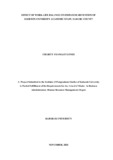EFFECT OF WORK-LIFE BALANCE ON EMPLOYEE RETENTION OF EGERTON UNIVERSITY ACADEMIC STAFF, NAKURU COUNTY
Abstract
Organizations face challenges in retaining talented employees, necessitating appropriate retention policies. Work-life balance is crucial for employee well-being, performance, and organizational success. This study aimed to assess the effect of work-life balance on employee retention of Egerton University academic staff, Nakuru County. The study examined the effect of flexible working arrangements, remote working arrangements, team support, and the moderating role of labor policies. Grounded in Herzberg's Two-Factor Theory, the Spillover Theory and Institution Theory. The study adopted a causal research design, targeting 412 academic staff with a sample size of 202. Data was collected through structured questionnaires and analyzed using descriptive statistics, correlation analysis, and multiple linear regressions with the help of statistical Package for Social Sciences. The multiple liner regression analysis determined the manner in which independent variables predict the dependent variables. The results were presented using tables. A pilot study was undertaken at Kisii University. The study used content validity index measurement of threshold of at least 0.78. Further the study used Cronbach Alpha coefficient to measure the validity and reliability. Descriptive statistics was used to describe the study constructs using frequency distributions, means and standard deviations. The regression revealed strong positive correlations between the independent variables and employee retention. Flexible working arrangements significantly predicted employee retention R = 0.863, R-square = 0.745, β =0.170. Remote working arrangements had a significant positive effect R = 0.797, R-square = 0.635, β =0.874. Team support significantly impacted employee retention R = 0.789, R-square = 0.622, β =0.919. The conclusions were that flexible working arrangements, remote working arrangements, and team support positively affected employee retention, while labour policies moderated this relationship. Recommendations included implementing flexible working policies, addressing isolation in remote work, fostering supportive team environments, and aligning labour policies with work-life balance initiatives. The study is relevant to the university management, the academic staff, the Government and the public

